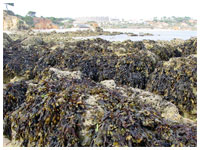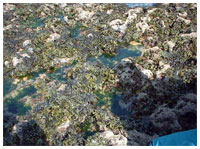home > research > the molecular basis for differential stress-tolerance in coexisting, ecologically similar algal species
The molecular basis for differential stress-tolerance in coexisting, ecologically similar algal species
 The intertidal zone of rocky shores is a severe habitat in which, over a small spatial scale, an extremely strong gradient of changing environmental conditions for marine organisms occurs. Intertidal seaweeds of the genus Fucus contain several similar and recently diverged species, with vertical distributions correlated with their desiccation-stress tolerances. However, despite a large amount of ecological literature on this topic, there is yet no mechanistic understanding of the biochemical and molecular basis of desiccation tolerance in fucoid algae. In this research theme we are follwoing a gene isolation strategy, by using PCR-based subtractive hybridization techniques established in our lab to isolate and identify desiccation- and rehydration-responsive genes in F. vesiculosus. The high degree of relatedness between
The intertidal zone of rocky shores is a severe habitat in which, over a small spatial scale, an extremely strong gradient of changing environmental conditions for marine organisms occurs. Intertidal seaweeds of the genus Fucus contain several similar and recently diverged species, with vertical distributions correlated with their desiccation-stress tolerances. However, despite a large amount of ecological literature on this topic, there is yet no mechanistic understanding of the biochemical and molecular basis of desiccation tolerance in fucoid algae. In this research theme we are follwoing a gene isolation strategy, by using PCR-based subtractive hybridization techniques established in our lab to isolate and identify desiccation- and rehydration-responsive genes in F. vesiculosus. The high degree of relatedness between  Fucus species (F. vesiculosus, F. spiralis, F. serratus) will be exploited to isolate full-length cDNA for desiccation/rehydration-responsive transcripts from cDNA libraries of each species. The intention is then to focus more narrowly on an individual gene(s) to identify cis-acting factors involved in transcriptional control.
Fucus species (F. vesiculosus, F. spiralis, F. serratus) will be exploited to isolate full-length cDNA for desiccation/rehydration-responsive transcripts from cDNA libraries of each species. The intention is then to focus more narrowly on an individual gene(s) to identify cis-acting factors involved in transcriptional control.On top, Fucus spiralis, Algarve (photo by G Pearson); right, Fucus spiralis at Ericeira


